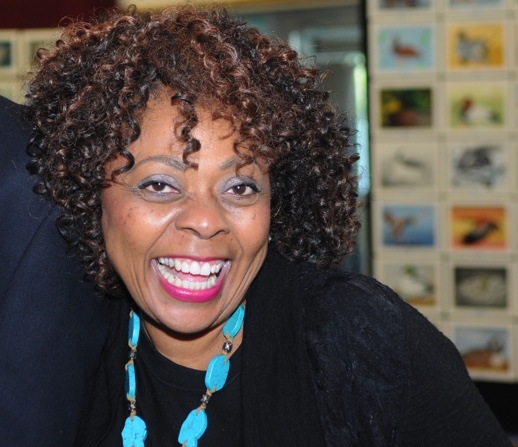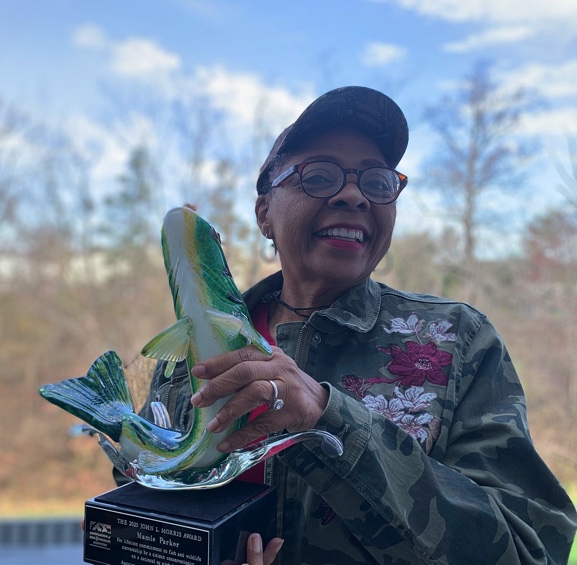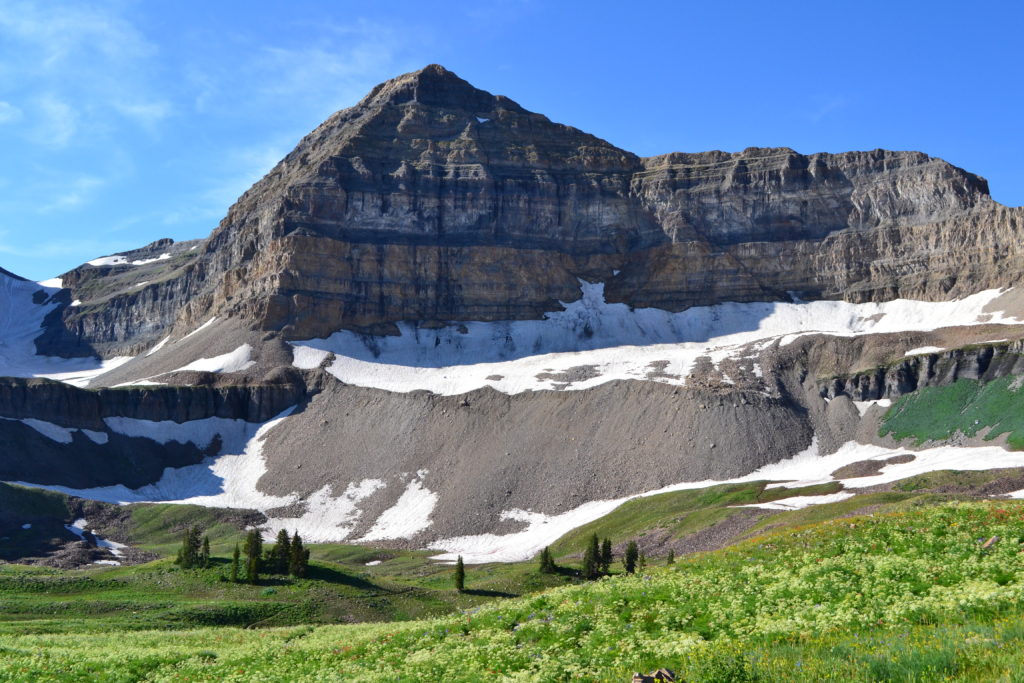Music inspires many of us. But it’s probably a first that a fisheries scientist was inspired to pursue her career by Marvin Gaye’s music. No, not something she heard through the grapevine, but his song, “Mercy, Mercy, Me,” that reminds us about “radiation underground and in the sky; Animals and birds who live nearby are dying.”

That fisheries scientist is Dr. Mamie Aselean Parker, born on October 14, 1957, in Wilmot, Arkansas. And it wasn’t just Marvin Gaye who inspired her. As Mamie tells it, “My mother was an avid angler, a sharecropper, had 11 children. I’m number 11. The rest…did not want to be outdoors, but she wanted a companion and taught me life lessons out there. She passed away when I was fairly young, and I decided to do this in her honor.”
Her mother was determined that Mamie would get a college education, and she worked hard to make her mother’s wishes come true. Parker ranked second in her high-school class and then earned a B.S. from the University of Arkansas-Pine Bluff in 1980. She went on to get advanced degrees (M.S. and Ph. D.) from the University of Wisconsin in fisheries and wildlife and limnology. She took an internship with the U..S. Fish and Wildlife Service in Wisconsin, as she said, “quite frightening for a Southern girl like myself that had hardly been north of Little Rock.”
But she never looked back. She spent 29 years working for the Fish and Wildlife Service, from the Mississippi River watershed and eastward, accomplishing many firsts for an African American woman along the way. She reached the highest levels in the agency, eventually serving as Regional Director for the 13 Northeastern states, Chief of Staff and Assistant Director for Fisheries (the agency’s highest position related to fisheries). In a radio interview, she recalled her unique journey: “I remember my first job here in the D.C. area, and the janitors in the building, they just kept coming and peeking in, and I thought “What are they looking at?” And finally I saw one in the bathroom, and she said, “I’ve been here for almost 40 years,” and she said, “No African-American woman has been in here except to clean this office.”

Parker has had enormous influence on sustaining our nation’s aquatic resources. She has worked across the range of aquatic issues, from fish culture to fisheries management to pollution abatement. She led negotiations with General Electric to reduce pollution of the Hudson River. Under her leadership, the Atlantic salmon was added to the endangered species list. On behalf of the US Fish and Wildlife Service, she worked with major corporations, including Walmart and PetSmart, to reduce their environmental footprints.
For her efforts, Parker has received innumerable awards and recognitions, again often a first for an African American woman. She was appointed to the board of the Virginia Department of Game and Inland Fisheries, later serving as the chair of the board and achieving major advances in migratory bird protections for the state. She was the first African American woman elected to the Arkansas Outdoor Hall of Fame. The list of her honors and leadership positions is too long to cover here, but one illustrates her impact: She received the Presidential Rank Award, the highest award given to a civilian employee of the federal government.
I have been privileged to know Mamie Parker for many years, having worked with her on various projects of the American Fisheries Society and other organizations. She is a wonder—intelligent, insightful, dauntless and charming. Her optimism makes the sun shine on the cloudiest of days. And she is an inspiration to all of us in conservation, but especially to women and members of underrepresented groups.
In your own career, wherever it might take you, please remember these words that she shared: “And then also, mentors are so important — having the right individual there for you when you think about quitting or you want to cry. A lot of times, I had to cry on the shoulders of those janitors in that building. You know, they were the ones that were there for me, telling me to get up and get back in the race again.”
Be like Dr. Mamie Parker, and always get back in the race, and help someone else who needs a hand to get back in her or his own race.
References:
DEL. Dr. Mamie Parker. Diverse Environmental Leaders National Speakers Bureau. Available at: https://www.delnsb.com/team/dr.-mamie-parker
Encyclopedia of Arkansas. Mamie Aselean Parker (1957-). Available at: https://encyclopediaofarkansas.net/entries/mamie-aselean-parker-4127/.
Mamieparker.com. Mamie Parker, PhD. Available at: https://mamieparker.com/about/.
Martin, Michael. 2015. From Fishing With Mom to Becoming A Top Fisheries Official. Morning Edition, July 14, 2015. Available at: https://www.npr.org/2015/07/14/421141198/from-fishing-with-mom-to-becoming-a-top-fisheries-official.
Natural Areas Organization. Biography — Dr. Mamie Parker. Available at: https://www.naturalareas.org/docs/Mamie_Parker_Biography.pdf.

